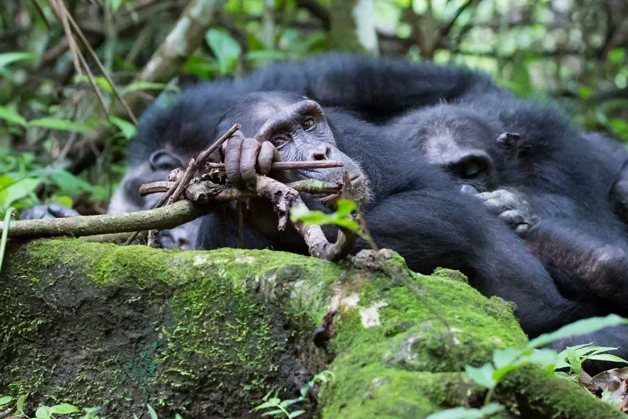Chimpanzee Habituation: Observing Wild Chimpanzee Behavior in their Natural Habitat

Chimpanzees, our closest living relatives in the animal kingdom, offer a fascinating window into understanding human evolution, behavior, and social dynamics. The process of habituation, wherein chimpanzees become accustomed to the presence of humans, allows researchers a unique opportunity to observe their behavior in their natural habitat. This article delves into the significance of chimpanzee habituation, the methodologies involved, and the insights gained from observing these remarkable primates.
Introduction to Chimpanzee Habituation
Chimpanzee habituation involves acclimating wild chimpanzee populations to the presence of humans. This process is crucial for researchers seeking to study chimpanzee behavior without significantly altering their natural environment. Habituation allows for more accurate observations of chimpanzee social structures, communication, foraging patterns, and tool usage.
Methodologies of Chimpanzee Habituation
The process of habituating chimpanzees to human presence requires patience, sensitivity, and a deep understanding of chimpanzee behavior. It typically involves gradual exposure to human observers over an extended period. Initially, researchers may observe chimpanzees from a distance using binoculars or cameras to minimize disturbance. As the chimpanzees become more accustomed to human presence, researchers may gradually decrease the distance between themselves and the chimpanzee groups.
Positive reinforcement techniques, such as providing food rewards or vocal encouragement, can also facilitate the habituation process. However, it is essential to minimize interference with the chimpanzees’ natural behaviors and avoid creating dependency on human presence or resources.
Significance of Chimpanzee Habituation
Chimpanzee habituation serves several crucial purposes in the field of primatology and conservation biology:
- Understanding Social Dynamics: Habituated chimpanzee groups provide researchers with the opportunity to observe intricate social interactions, dominance hierarchies, mating behaviors, and group dynamics. These observations offer insights into the evolution of human social behavior and relationships.
- Conservation and Protection: Habituation can aid in conservation efforts by providing valuable data on chimpanzee populations, habitat utilization, and threats they face. Understanding chimpanzee behavior in their natural habitat is essential for developing effective conservation strategies and protecting their dwindling populations.
- Promoting Ecotourism: Habituated chimpanzee groups can serve as attractions for ecotourism, generating revenue that can contribute to local economies and conservation initiatives through chimpanzee trekking tours. However, it is crucial to manage tourism activities carefully to minimize disturbance to the chimpanzees and their habitat.
- Educational Opportunities: Observing habituated chimpanzees in their natural habitat can inspire public interest in conservation and foster a greater appreciation for the natural world. Educational programs centered on chimpanzee behavior and ecology can raise awareness about the importance of protecting these iconic primates and their habitats.
Insights Gained from Chimpanzee Habituation
Through the process of habituation, researchers have gained valuable insights into various aspects of chimpanzee behavior and ecology:
- Tool Usage and Cultural Differences: Observations of habituated chimpanzee populations have revealed diverse tool-using behaviors, including the use of sticks for termite fishing, stones for cracking nuts, and leaves for sponging water. Furthermore, researchers have documented cultural variations in tool use among different chimpanzee communities, highlighting the complexity of chimpanzee cultures.
- Communication and Social Structures: Close observation of habituated chimpanzee groups has shed light on their complex communication systems, including vocalizations, gestures, and facial expressions. Researchers have also gained insights into chimpanzee social structures, including the formation of alliances, cooperation in hunting and territorial defense, and the role of alpha males in maintaining group cohesion.
- Foraging Strategies and Dietary Preferences: Habituated chimpanzees provide researchers with opportunities to study their foraging strategies, dietary preferences, and adaptations to different habitats. By observing their feeding behaviors and food choices, researchers can better understand the nutritional requirements and ecological roles of chimpanzees in their ecosystems.
- Reproductive Biology and Parental Care: Habituated chimpanzee populations offer glimpses into their reproductive biology, including mating behaviors, estrus cycles, and parental care. Observations of infant care, socialization, and grooming rituals provide insights into the complexities of chimpanzee social bonds and familial relationships.
Challenges and Ethical Considerations
While chimpanzee habituation offers numerous benefits for scientific research and conservation, it also poses several challenges and ethical considerations:
- 1. Disturbance and Stress: The process of habituation can be stressful for chimpanzees, particularly if not conducted sensitively. Researchers must minimize disturbance and ensure that their presence does not disrupt the natural behaviors and social dynamics of chimpanzee groups.
- Human-Wildlife Conflict: Habituated chimpanzees may become more vulnerable to human-wildlife conflict, including poaching, habitat destruction, and disease transmission. Researchers and conservationists must work closely with local communities to mitigate these conflicts and promote coexistence between humans and chimpanzees.
- Long-Term Effects: The long-term effects of habituation on chimpanzee behavior and ecology remain poorly understood. Continued monitoring and research are essential to assess the impact of habituation on individual chimpanzees, social dynamics, and population viability.
- Conservation Priorities: While habituation can provide valuable data for scientific research, conservation priorities must prioritize the protection of chimpanzee populations and their habitats. Researchers and conservationists must balance the benefits of habituation with the need to minimize disturbance and prioritize the welfare of chimpanzees.
Conclusion
Chimpanzee habituation offers a unique opportunity to study these remarkable primates in their natural habitat, providing insights into their behavior, ecology, and evolutionary history. By fostering a deeper understanding of chimpanzee social dynamics, communication, and cultural diversity, habituation contributes to conservation efforts and raises awareness about the importance of protecting these iconic species and their habitats. However, researchers and conservationists must approach habituation with sensitivity, ethical considerations, and a commitment to promoting the well-being of chimpanzees and their ecosystems. Through careful observation and research, we can continue to unravel the mysteries of our closest living relatives and ensure their survival for generations to come.




